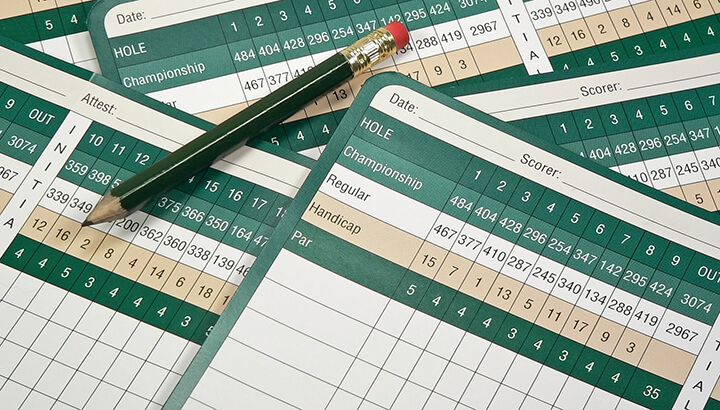Whether or not to keep score is one of the game’s longest-running debates and one that seems to never have a right or wrong answer.
There are some who think that golf was, is and always should be a game of numbers. Need more proof? Look at the scorecard. It resembles a math test. Others believe golf should be an enjoyable, spiritual pastime filled with less numbers and more sight seeing, experiencing, feeling the outdoors and every shot.
Perhaps the ultimate answer to the debate — like so many others — is to fall somewhere in the middle. It’s okay to admit that golf is, in fact, a game of numbers and that success (or failure) needs to be measured somehow. It’s also fine to submit that golfers — especially amateurs — should relax a little bit and stop worrying about the outcome so much.
Golf Digest writer Max Adler explored the topic in a recent column, talking with golfers at nearly every skill level. Many thought that golf as we have always known it shouldn’t be the end-all, be-all any longer. In the article, 2006 U.S. Open champion Geoff Ogilvy said, “Stroke play is a nonsense game — I don’t see why anyone would do it who didn’t have to.”
Stroke play is great for competitive golfers. It levels the playing field and truly pits each and every player against the golf course and its conditions. But, for the rest of us who are playing the game on our days off and hoping to enjoy ourselves, perhaps there are other ways.
There are plenty of measures of success on the golf course without tying yourself to the stringent scorecard. If you’re playing by yourself, for example, consider skipping the full scorecard and instead measure your success by monitoring two crucial elements: fairways hit and greens in regulation.
These two metrics are vital to your overall success as a golfer, so it could be argued that fairways hit and greens in regulation are more important for an improving player than monitoring pars and bogeys. If you want to put this into play, next time you golf, aim to hit as many fairways as you can off the tee. Also monitor your greens in regulation, and remember, it varies. On par 3s, you should aim to hit the green on your tee shot. For par 4s, you must reach the green in two shots to record a green in regulation. On par 5s, reaching the green in three shots means you’ve hit the green in regulation.
Another way to monitor your success while also shedding the pressures of the all-mighty scorecard is to participate in a match play match. If you’re playing with a partner who’s of equal skill level, you can play “straight up.” If there is a difference in your skill level, simply handicap the match appropriately by awarding shots to the less-skilled golfer. Then, play against your partner — not necessarily the course and scorecard.
Another way to play golf without the pressure of the scorecard is to focus on and keep score of the small things. Matt Saternus, director of instruction at Plugged In Golf, noted that a better way to keep score would be to tally the key areas you’re focused on. During your round, you could keep track of any combination of the following: mishits, three-putts, missed greens inside of 50, 100 and 125 yards or even positives or negatives relating to your swing.
As Saternus notes, “By keeping track of small things like this, you shift the focus from this one big, abstract picture to a couple small, clear ones. When you walk off the course, you’ll have clarity knowing that you struck the ball well, made your short putts or committed to your shots.”
So, should you always keep score when you play? No, not in the literal sense. But monitoring your successes and failures will only help you get better. Keeping score isn’t mandatory, but we suggest that you find a way to track your progress and, of course, enjoy the game!
— Ben Larsen
